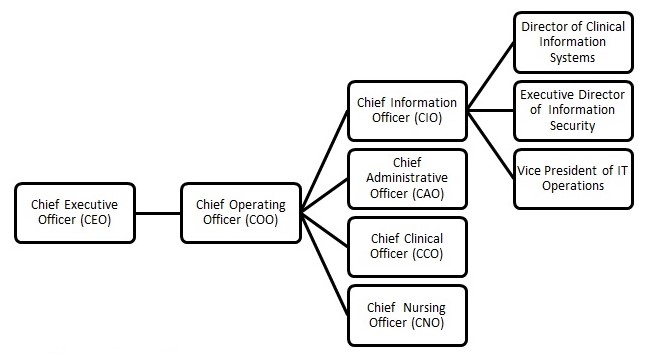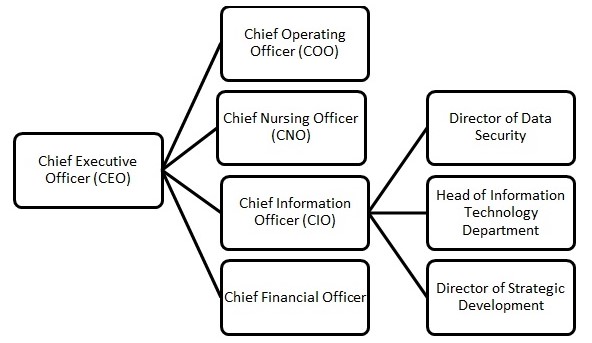The role of a chief information officer (CIO) is crucial for many organizations. In healthcare, a sphere that is constantly changing and stays vital for society at any time, CIOs must not only adapt to transitions but ensure that technology and information processes benefit the patient and health care providers. CIOs have “a senior strategic role, usually at executive level, regarding things such as the purchase of IT equipment, decisions on systems and delivery of the overall ICT strategy” (Sridharan et al., 2018, p. 89). This paper presents an evaluation and comparison of two interviews conducted with CIOs of two health organizations and an analysis of their job perceptions.
Duties and Responsibilities of CIOs
For this paper, two CIOs were interviewed: AA and BB. For AA, the main duties that he has identified are organizing information systems, developing strategy and policies concerning technology, and supervising the work of different departments (telecommunications). BB, in addition to these responsibilities, mentioned handling data processing and ensuring security and confidentiality.
Required Skills and Competencies of CIOs
The set of skills and competencies required from a CIO for both AA and BB are quite similar as they reflect the correlating duties and responsibilities. They named such skills as strategic planning and thinking, project management skills, decision-making, leadership, and effective communication skills. Moreover, both of them named two key competencies necessary for a CIO in healthcare: strong IT skills and understanding of health care specifics.
Reporting and Decision Making
Both CIOs admitted that they report to chief executive officers who are responsible for the majority of processes. Such a direct point of contact with a CEO is quite satisfactory for both interviewees. Although, interviewee AA expressed the complications of being a direct subordinate to the COO. However, both admitted that the decision-making process could be less complicated as sometimes it is difficult to convey their ideas. The reason for this is that both CIOs feel that while information and digital processes are becoming more significant for health care organizations, the role of the department responsible for them is not always fully acknowledged.


Challenges for the Future
Upon asking about challenges for the next five years, both CIOs admitted that it is quite difficult to predict the future with new technologies developing and emerging every day. However, both of them noted two main areas to which special attention should be paid – artificial intelligence and cybersecurity. They are also expecting to constantly propose new ways of running the hospital: from self-service to data handling. Moreover, one of the challenges is to ensure better communication between technology departments and the rest of hospitals. In accordance with general trends presented in the media, both CIOs strive for IT departments to get a more strategic position so that innovation becomes a core principle for the whole process of health facility management (Chou, 2019).
Recommendations
With changes happening in healthcare and with a rapid development of innovations, it is important to focus on innovation and processes that would ensure the integration of innovations and new technologies into everyday activities of healthcare facilities. For CIOs, it means that they need to constantly follow trends, learn about new technologies, and embrace new trends. Creating alliances of IT executives in healthcare would help coordinate the assessment and implementation of artificial intelligence and cybersecurity initiatives into hospitals’ operations. Such alliances could organize academic events, with presentations from researchers and healthcare practitioners. As some researchers suggest, it might be effective to create a position of Chief Digital Officer as it will allow to share the workload and CIOs will retain their strategic duties (Haffke et al., 2016). Such a position would contribute to the administrative solutions proposed by CIOs (data coordination, self-service, etc.) and serve as an opportunity for IT departments to get representation among hospital executives.
Conclusion
This paper provided a brief overview of two interviews conducted in order to analyze the current role of CIOs in health care institutions. Based on observations, it is possible to make a conclusion that the current situation is posing similar challenges for all health care institutions and their IT departments. These conclusions and proposed recommendations will hopefully be useful for the further research on the role of CIOs in healthcare system structure and the ways of its development.
References
Chou, D. (2019). The healthcare CIO’s role in strategy. Constellation Research Blog. Web.
Haffke, I., Kalgovas, B., & Benlian, A. (2016). The role of the CIO and the CDO in an organization’s digital transformation. ICIS Proceeedings, 1, 1-20.
Sridharan, S., Priestman, W., & Sebire, N. J. (2018). Chief information officer team evolution in university hospitals: Interaction of the tree ‘C’s (CIO, CCIO, CRIO). Journal of Innovation in Health Informatics, 25(2), 88-91.